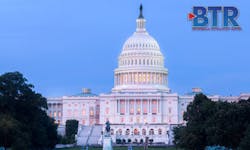The U.S. Senate voted pretty much according to party lines (50-48) last week to nix the FCC's broadband privacy rules. The Broadband Privacy Order, passed in October 2016 under former FCC Chairman Tom Wheeler, would have required broadband providers to secure opt-in permission before sharing data, like web-browsing histories.
The Senate acted under the auspices of the Congressional Review Act (CRA), which gives Congress 60 legislative days to review and reject agency regulations. S.J. Res 34 was introduced by Sen. Jeff Flake (R-AZ) and a number of co-sponsors.
Approval in the Senate means the matter will now go to the House, and then, if the repeal passes with a simple majority, on to the president to be signed. If this happens, the FCC is prohibited from passing similar rules again, according to TechFreedom. A House vote is expected as early as this week.
"The FCC will soon return broadband privacy policing to the Federal Trade Commission, where it belongs, like all online privacy. In the meantime … the FCC will police broadband privacy case-by-case," said TechFreedom President Berin Szoka.
Critics of the repeal, like the Center for Digital Democracy (CDD), say that without the FCC rule, broadband customers in the United States will not have any "real" privacy protections since the Federal Trade Commission was limited in its actions by Congress and the courts.
"It's clear that the GOP Senate, the big broadband companies, and major advertisers were terrified of having to ask American consumers permission before using their information," said Jeff Chester, executive director of the CDD.
Szoka said it took two years for the FCC to issue the privacy rules after reclassifying broadband as a common carrier service via the Open Internet Order adopted in February 2015. He said the agency will still be able to keep a "watchful eye" on privacy; it just cannot impose monetary penalties for "practices it hasn't previously declared unjust and unreasonable."
"The Wheeler FCC was wrong to apply Title II to broadband. Once the FCC disclaims legal authority, the issue of broadband privacy will return to the Federal Trade Commission where it belongs," Skoka said.
In a statement, the American Cable Association said the regulations would have imposed "unwarranted and burdensome regulations" on smaller broadband providers and that meanwhile the Internet edge providers were exempt.
ACA President and CEO Matthew Polka said member companies remain under the auspices of state and federal unfair and deceptive trade practices, data security and breach notification laws. "Moreover, (ACA members) have released a voluntary set of ISP Privacy Principles that cover transparency, consumer choice, data security and data breach notification and are consistent with the FTC's long-standing framework."
Earlier this month, the FCC under its new Chairman Ajit Pai issued a temporary stay of the rule to provide time for the FCC to work with the FTC to create a consistent online privacy framework.





